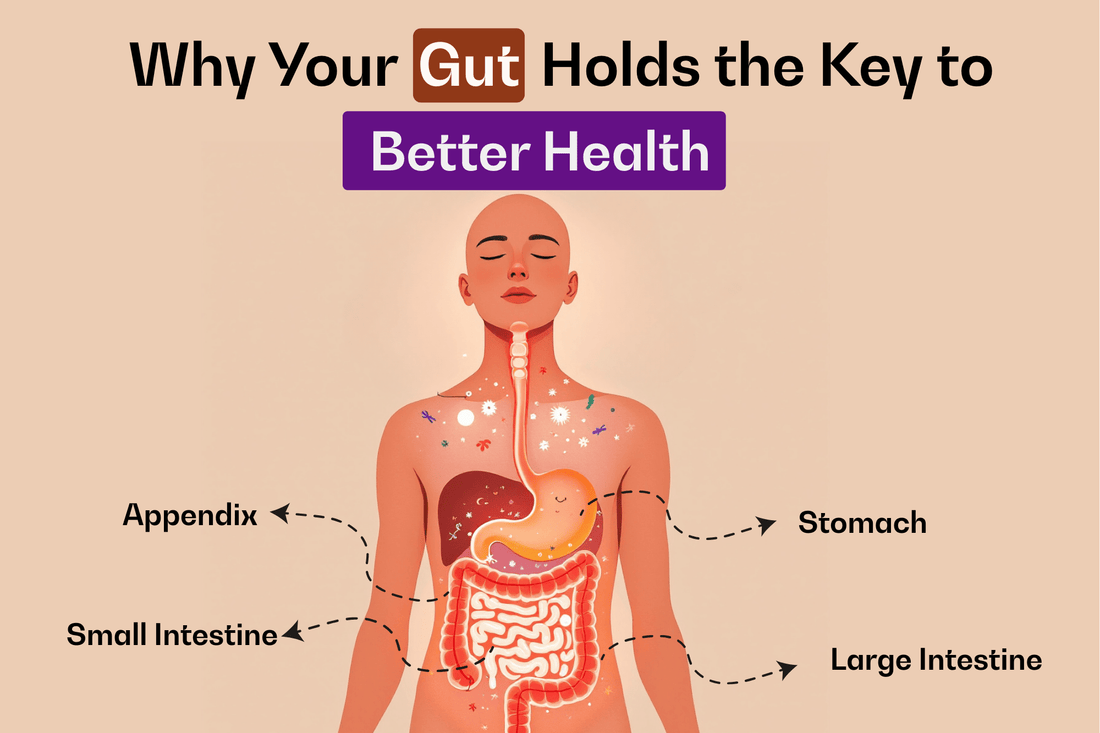
Why Your Gut Holds the Key to Better Health
SHAILENDRA YADAVShare
Gut Health: Why Everyone's Talking About It
“Gut health.” Heard that phrase lately? From influencers to doctors, everyone’s suddenly talking about it. But what does it actually mean — and why is it showing up everywhere from skincare reels to diet plans?
You may think your gut just helps you digest food. But what if I told you it’s also shaping your mood, energy, immunity — even the way you think?
This hidden world inside your body is constantly talking to your brain, deciding how you feel, fight illness, and function every day.
What Is the Gut?
When we say “gut,” we’re not just talking about your stomach. Your gut includes your entire digestive system — from mouth to intestines. It’s also home to trillions of bacteria, fungi, and microbes, all working quietly to keep your body in balance.
This little universe inside you is called the gut microbiome. And trust me, it’s more powerful than you think.
So, Why Is Gut Health a Big Deal?
Because your gut is like your body’s control center. Here's what it quietly manages:
- Digestion & Nutrient Absorption – No gut, no fuel.
- Mood & Mental Health – 90% of your serotonin (feel-good hormone) is made in your gut.
- Immunity – 70% of your immune system sits in your gut lining.
- Weight & Energy – A happy gut helps balance hunger, sugar levels, and cravings.
A 2022 study in Nature Reviews showed that people with diverse gut bacteria had lower risks of depression, obesity, and metabolic disorders.
Is Your Gut Happy?
Here are signs your gut might be waving a red flag:
- Feeling bloated often
- Low energy or brain fog
- Mood swings or anxiety
- Constipation or irregular digestion
- Sugar cravings that just won’t quit
If this sounds like you, it’s time for a gut check.
How to Support Your Gut (Without Changing Your Whole Life)
No expensive juices or 100-step routines needed. Small shifts make a big impact:
-
Eat More Fiber
Fiber feeds good gut bacteria. But most of us barely get 15g/day (you need 25–30g!). Try:- Chana, peanuts, lentils
- Fruits like banana, guava
- Whole grains, oats, millets
- Nutty Village’s high-fiber peanut chikki & energy bars 🥜
-
Fermented Foods Are Your Friends
Curd, kanji, pickles, idli-dosa batter — rich in probiotics (good bacteria). -
Stay Hydrated
Fiber + water = smoother digestion and detox. -
Sleep, Movement, Stress
Your gut feels what you feel. Sleep better, move daily, breathe deeper.
The Indian Gut – Where We Went Wrong
Our dadi-nani diets were secretly gut-friendly: dal chawal, thecha, saag, seasonal fruits, fermented rice, etc.
But today:
- Maida, sugar, chips = everywhere
- Packaged snacks replace real food
- Even “healthy” bars are ultra-processed
The result? Gut confusion. Digestive issues. Energy crashes. Poor mood.
It’s time to bring real food back. And no, it doesn’t have to be boring — it just needs to be closer to what our bodies actually recognize as food: whole, local, simple, and made with care.
Let your gut feel at home again.
FAQs
It’s the ecosystem of bacteria and microbes in your gut. A diverse microbiome = better health, mood, and digestion.
Combine: 1 bowl dal, 1 fruit, 1 roti with bran, a handful of roasted chana, and some veggies — that’s almost 20g right there! Eat more salad like cucumber and carrot to complete your daily intake.
Yes, intermittent fasting (like 5:2) gives your gut time to rest and reset. A 2019 study in Cell Metabolism showed improved gut bacteria diversity and insulin response in those who practiced time-restricted eating.
Not necessarily. Start small. Roasted or soaked peanuts are easier to digest. And nut butters can be gentler on the stomach.
Yes — if it’s made right. Peanuts are rich in fiber and good fats that feed your gut bacteria. Just choose ones with no added sugar or oil — like Nutty Village’s natural nut butters.







